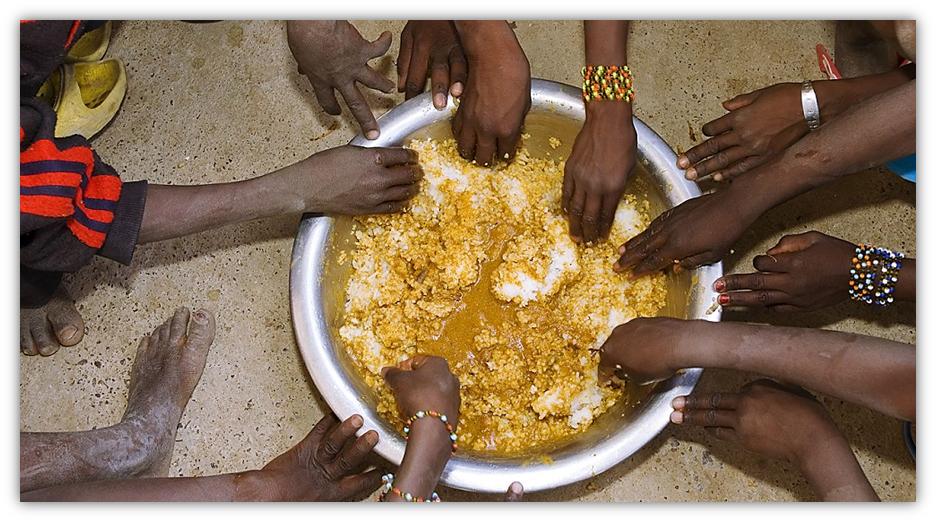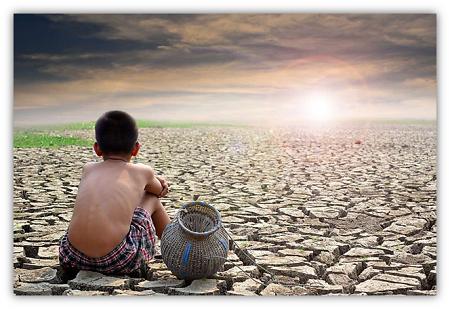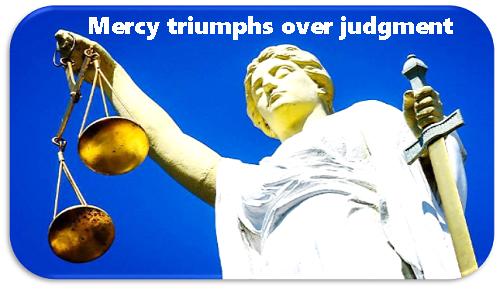Judgment and Mercy in a World of Hunger
Judgment and Mercy in a World of Hunger

We can see the hand of God in the poverty in the world: his judgment. It is important that we recognize this as we work hard to do something about it. I want to explain and defend that proposition in this article against readily available objections. I shall also draw some practical conclusions from it.
In the book of Revelation we see the judgments of God over the world as the seals of the scroll are opened, the trumpets are sounded, and the bowls are poured out.
It is characteristic of those judgments as they are described in that book that:
- they exceed human measure;
- they exceed the known natural world with its laws of cause and effect;
- they are expressions of God’s wrath.
God’s Hand in Violence⤒🔗
1. God reveals his wrath in a way that exceeds the dimensions of human action and of human society. That is not always the case. In Romans 1:18 and following Paul shows how the wrath of God is revealed in human society: God gave people over to unbridled sin. This is human action, but its dimensions are bewildering. This is not normal; it is no longer ordinary. We sometimes call it inhuman, sometimes even bestial. We experience the same thing when we consider the injustice in world-wide society, including violence, repression and corruption, the unrighteous structures that keep people poor and deny them prosperity, development, culture, and access to the power structures that are available in this world.
A “judgment” is literally in the first place a judicial pronouncement. That God is angry with people is explained in first instance in the preaching. God addresses people as sinners. The preaching is done by people, usually quite ordinary people. Normally it does not cause amazement; it is not sensational. But when God lets us feel what he is saying and we experience it, it is gripping. When the seals of the scroll are opened, as described in Revelation 6, war breaks out, accompanied by much misery: force of arms, economic misery, hunger, and infectious diseases. This is still about human action: “so that people should slay one another” (Rev. 6:4). But at the same time it is divine action. That is evident in the dimensions. God gives people over to acts of war and people die. Who can prevent it?
Horror←⤒🔗
2. The judgments in Revelation exceed that proportions of what we call “natural disasters.” They are incapable of being analyzed for cause and effect. They burst out of the frameworks of our familiar world. A pastor who is motivated to preach about one of the seals or one of the bowls in Revelation because of the problems caused by environmental pollution, an epidemic, or a tsunami, will have difficulty. The plagues described in Revelation are generally different. They are frightful in their strangeness. They are truly images of horror that we do not encounter in reality.
That has often caused Christians to maintain that in the future, in the end times — in which we are not living currently — it will become much worse than now. That leads to Christian horror stories.
But this is doubtful. Other explanations are possible. The plagues have a symbolic meaning. The turning of water into blood points to the plagues in Egypt and thereby shows us a continuing line in the judgment of God. The plagues also announce and depict demonic powers that are active in the disasters that occur. In any event, the judgments in Revelation show that God is active in his world. He intervenes directly. We must respect his majesty, which rises above human and natural factors.
Poverty is more than just poverty. The word is easy to use in a world view in which the economy is central. But there is more involved. We express that in the usual couplets, “poor and miserable,” “the poor and the oppressed,” “the poor and the marginalized,” “the poor and the destitute” (penniless), “the poor and the deprived” (people who have been robbed, denied justice). Poverty is connected to everything, to a lack of everything: politics, justice, morality, community, health, room to live, safety, education… New disasters happen everywhere and they lead to more poverty and that frustrates developmental aid. Poverty is infectious, so that we speak of “sowers of poverty.” It is disruptive, destructive. We don’t know how to handle it. Not only our actions, but also our analyses don’t help. What else can still happen to us?

In the middle of the plagues in Revelation sounds the threefold “Woe!” (Rev 8:13). Humanity is being told to fear. When God acts, human beings are powerless.
Majesty←⤒🔗
3. Calamities, misery, and poverty are an expression of God’s wrath, but that is not always the case. Powerful phenomena in nature are in first instance expressions of God’s majesty (cf. the last chapters of the book of Job). People who live close to a volcano, or in a low-lying area near water, know that can happen. It’s impossible to live risk-free. And when a disaster happens, it is inappropriate to blame God.
Poverty can be the direct result of one’s own failure. The sluggard will become poor says the book of Proverbs (6:9-11). That is a matter of cause and effect; God’s hand is not in it.
But Proverbs also says the opposite: “The hand of the diligent makes rich” (10:4 and passim). Still, that is not a general rule. “The blessing of the Lord makes rich”; labour adds nothing to it (10:22).
The poor are often the object of God’s special care. He has compassion on them. He sticks up for them against the oppression of the rich and the powerful. He hears their cries for help. Their faith in him is tested, but they are not put to shame.
Everyone!←⤒🔗
We cannot say that poverty is a judgment of God in every situation. The poor are especially the object of God’s wrath. That is clear from the book of Revelation. When the seals were opened, a fourth of the earth was struck; a third when the trumpets were sounded. The book does not mention which part; people are affected promiscuously. Throughout the book those who belong to God are saved. They are occasionally subjected to a plague too, but in general it is unclear from history how that occurs and why some people are struck while others are not. When a fourth of the earth is struck and then a third, it is an increasingly stronger warning to the world as a whole. "Do you think that these . . . were worse sinners than all than all the other[s]? . . . No, I tell you; but unless you repent, you will all likewise perish” (Luke 13:2, 5).1
This shows that there is not normally a causal connection between sin and judgment. God’s punishments are not bound by the law of cause and effect. The problem is not that people have not taken precautions to prevent catastrophes, or to alleviate their consequences. The problem is that they continued with their idolatry, killing, sorcery, sexual immorality, and theft (Rev. 9:20ff.).
Poverty in part of the world is a judgment over the whole world. Not especially over social injustice, injustice by the rich and the powerful toward the poor and the powerless, but over all forms of sin, all godlessness.
The final judgment will come over Babylon, the rich city. It cannot be identified with a particular city (Rev. 11:8), but is an amalgam of Sodom and Jerusalem, New York and Las Vegas, Rome and Mumbai. It is the symbol of the wealth on the earth, the power, the economic might, that is abused, corrupted, perverted, and of its victims: “bodies and souls of men” (Rev. 18:13). All that wealth was destroyed in an instant. Only a pathetic rubbish heap remains, poor, robbed, miserable, helpless, etc.
Guilt←⤒🔗
Poverty as judgment of God does not therefore mean that the poor are more guilty than others. Poverty in part of the world is a warning to the rest of the world, also the rich Western world. Some have suggested that there is a causal connection. In other words that poverty and hunger in the world can be connected directly to human actions. The wealthy part of the world is supposedly the part in which a Christian ethos has made itself felt. 2 Famine is said not to occur in democracies, because a timely alarm is sounded if the available food supply is not distributed evenly.3
We don’t have to discuss such analyses, for they do not explain how God’s judgment and his blessing work.

Poverty as judgment of God, that is real. It happens now. That does not mean that it is more real today than in the past. Earlier generations lived in the “last days,” or the “end times” just as much as we do. The book of Revelation applied when the plague devastated Europe, when the Turks stood before the gates of Vienna, when the Krakatau volcano erupted. And it applies today. The reverse is true too. If it is true that there is now more prosperity in the world than in earlier times and less poverty, it doesn’t make the seriousness of God’s judgment any less. It is not the case that Revelation 6, 9, and 16 will be fulfilled only in the future and that we are still able to survey the misery better now. But you cannot quantify the intensity of the suffering of humanity. You engage in speculation when you compare former times with today. Today it is the time to take the book of Revelation seriously.
Mercy←⤒🔗
I have saved the most important objection to the end. Should we speak less about judgment and more about mercy? In fact, the two go together. Mercy is deliverance from the judgment, from a very real judgment. “Mercy triumphs over judgment” (James 2:13). Mercy says, Indeed, there is a judgment, but I know of a way to escape it. Both come from God. In his wrath he thinks about exercising mercy (cf. Hab. 2:3).
God’s righteousness encompasses both judgment and mercy. That’s why you can’t play one off against the other. It is absurd to place greater emphasis on the one than on the other. Judgment without mercy is hopeless. Listening to it when it is proclaimed makes no sense, because it doesn’t help you at all. But on the other hand, mercy does not become more attractive if there is no judgment. For then mercy fades, becomes cheap, and matter-of-course. It would no longer be the message of Jesus on the cross. He underwent the judgment. Mercy is real, because the judgment is real.
That is why we too want to do something to combat poverty. Our motivation is more that human sympathy, or feelings of guilt, let alone a feeling of superiority of one who is successful, someone who can deliver what the wretched poor lack. Rather, it is the love of Christ that moves us, the love of him who delivers us from God’s judgment.
Motivation←⤒🔗
What does all this mean in practice?
1. When we engage in developmental aid, seek to combat poverty, and try to promote social righteousness, it has a deep motive. It is more than mending a part of society. We try to show something of God’s grace in the life of people that groan under a judgment.

We respect God’s ongoing judgment, a judgment that has not yet concluded. That makes us modest in our presumptions. We don’t create righteousness. We share in the righteousness that we have received from God.
It makes us modest in our aspirations. We come as followers of a crucified Christ, of him who underwent God’s judgment over this world. We don’t establish a better world. “Righteousness, peace, and the integrity of creation” are beautiful words. They speak of faith and a perspective and that is something different than a program. They are not goals that we presume to reach within a specified period of time.
But we are deeply motivated. We do not proceed out of optimism, “positive thinking,” or self-confidence, but out of faith.
Hype?←⤒🔗
2. Developmental aid demands proclamation of the gospel. For we are motivated by the hope that people will be delivered from God’s judgment. In the aid that we offer to poorer parts of the world, word and deed must go hand in hand. That was not as obvious in the past as it is now, but it has grown into a consensus about the relationship between the two (although there is plenty of material left for discussion about their mutual relationship).
Developmental aid without the gospel is not wrong. Sometimes it is the only thing possible. But it is less efficacious. Developmental aid seeks to give people room to live, room to hear and follow the voice of the Lord.
3. Now a more specific conclusion. As we saw, economic and social upheaval does not happen as a result of social injustice, especially in particular areas of the world. It is God’s judgment over widespread idolatry and godlessness in the whole world: unrepentance, unthankfulness, quarrelsomeness, sexual sins, drunkenness, insincerity.
That is why combating poverty and developmental aid should not be done in isolation. Christians would do well not to be guided by the hype of the world. Obedience is not to be found now especially in help to people in poor countries, then especially in concern for the environment, and then especially in evangelization. It is not in the first place a matter of being active in particular programs.
Do we, wealthy folks, feel guilty when confronted with dire poverty? Why? We may well not have caused injustice to those poor people. But we are guilty of other sins. And that is why, although we are not poor, are also subject to the judgment. We also need to be delivered from it. If we want to promote social justice, we have to do more than share our wealth and expertise with the poor, and oppose oppression. Then we must be converted completely. And we must also, albeit discretely, depending upon our position, promote conversion to others. Radical developmental aid is a matter of sanctification. To improve the world, you must begin with yourself.

4. All of this together will intensify and deepen our prayer life. Praying is more than asking for more food and money for the poor. It is more than asking for God’s blessing over our programs. Praying is to seek, in faith, God’s merciful deliverance from the distress of the world that groans under God’s judgments. Lord, have mercy, come! That is what we pray for the poor in Kenya, Darfur, India, Burkina Faso, or wherever our heart goes out. Including for ourselves.

Add new comment